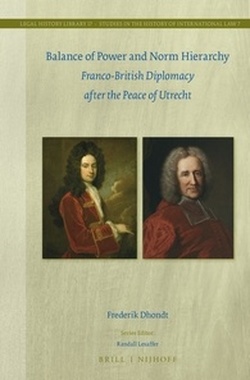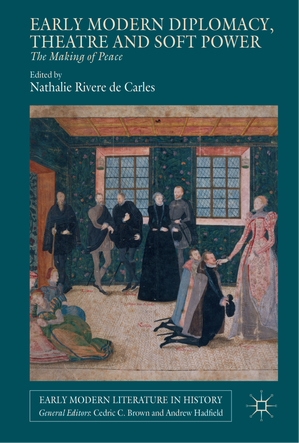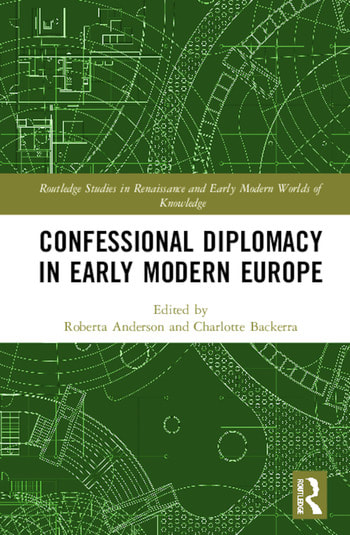Roberta Anderson and Charlotte Backerra (eds): Confessional Diplomacy in Early Modern Europe. Abingdon: Routledge, 2019
Confessional Diplomacy in Early Modern Europe examines the role of religion in early modern European diplomacy. In the period following the Reformations, Europe became divided: all over the continent, princes and their peoples split over theological, liturgical, and spiritual matters. At the same time, diplomacy rose as a means of communication and policy, and all powers established long- or short-term embassies and sent envoys to other courts and capitals. The book addresses three critical areas where questions of religion or confession played a role: papal diplomacy, priests and other clerics as diplomatic agents, and religion as a question for diplomatic debate, especially concerning embassy chapels.
Confessional Diplomacy in Early Modern Europe examines the role of religion in early modern European diplomacy. In the period following the Reformations, Europe became divided: all over the continent, princes and their peoples split over theological, liturgical, and spiritual matters. At the same time, diplomacy rose as a means of communication and policy, and all powers established long- or short-term embassies and sent envoys to other courts and capitals. The book addresses three critical areas where questions of religion or confession played a role: papal diplomacy, priests and other clerics as diplomatic agents, and religion as a question for diplomatic debate, especially concerning embassy chapels.

Three new books forthcoming:
Roberta Anderson, Laura Olivàn Santaliestra & Suna Suner (eds.) Gender and Diplomacy. Women and Men in European and Ottoman Embassies from the 15th to the 18th Century. [working title] Vienna: Hollitzer Verlag, 2019 (Diplomatica 2)
Roberta Anderson, Reinhard Eisendle & Suna Suner (eds.) Performance of Diplomacy in the Early Modern World. [working title] Vienna: Hollitzer Verlag, 2019 (Diplomatica 3)
Suna Suner, Opera and Diplomacy from the Ottoman World to Papal Rome. [working title] Vienna: Hollitzer Verlag, 2019 (Ottomania 12/ Diplomatica 4)
Roberta Anderson, Laura Olivàn Santaliestra & Suna Suner (eds.) Gender and Diplomacy. Women and Men in European and Ottoman Embassies from the 15th to the 18th Century. [working title] Vienna: Hollitzer Verlag, 2019 (Diplomatica 2)
Roberta Anderson, Reinhard Eisendle & Suna Suner (eds.) Performance of Diplomacy in the Early Modern World. [working title] Vienna: Hollitzer Verlag, 2019 (Diplomatica 3)
Suna Suner, Opera and Diplomacy from the Ottoman World to Papal Rome. [working title] Vienna: Hollitzer Verlag, 2019 (Ottomania 12/ Diplomatica 4)

Frederik Dhondt, Balance of Power and Norm Hierarchy: Franco-British Diplomacy after the Peace of Utrecht (2015) offers a detailed study of French and British diplomacy in the age of ‘Walpole and Fleury’.
After Louis XIV’s decease, European international relations were dominated by the collaboration between James Stanhope and Guillaume Dubois. Their alliance focused on the amendment and enlargement of the peace treaties of Utrecht, Rastatt and Baden. In-depth analysis of vast archival material uncovers the practical legal arguments used between Hampton Court and Versailles. ‘Balance of Power’ or ‘Tranquillity of Europe’ were in fact metaphors for the predominance of treaty law even over the most fundamental municipal norms. An implacable logic of norm hierarchy allowed to consolidate peace in Europe.
After Louis XIV’s decease, European international relations were dominated by the collaboration between James Stanhope and Guillaume Dubois. Their alliance focused on the amendment and enlargement of the peace treaties of Utrecht, Rastatt and Baden. In-depth analysis of vast archival material uncovers the practical legal arguments used between Hampton Court and Versailles. ‘Balance of Power’ or ‘Tranquillity of Europe’ were in fact metaphors for the predominance of treaty law even over the most fundamental municipal norms. An implacable logic of norm hierarchy allowed to consolidate peace in Europe.

Nathalie Rivère de Carles, (ed.) Early Modern Diplomacy, Theatre and Soft Power: The Making of Peace (Palgrave MacMillan (2016)
This book explores the secret relations between theatre and diplomacy from the Tudors to the Treaty of Westphalia. It offers an original insight into the art of diplomacy in the period 1580-1655 through the prism of literature, theatre and material history.
Contributors [several of whom are Network members] investigate English, Italian and German plays of Renaissance theoretical texts on diplomacy, lifting the veil on the intimate relations between ambassadors and the artistic world and on theatre as an unexpected instrument of 'soft power'. The volume offers new approaches to understanding Early Modern diplomacy, which was a source of inspiration for Renaissance drama for Shakespeare and his European contemporaries, and contributed to fashion the aesthetic and the political ideas and practice of the Renaissance.
Buy now from Amazon
This book explores the secret relations between theatre and diplomacy from the Tudors to the Treaty of Westphalia. It offers an original insight into the art of diplomacy in the period 1580-1655 through the prism of literature, theatre and material history.
Contributors [several of whom are Network members] investigate English, Italian and German plays of Renaissance theoretical texts on diplomacy, lifting the veil on the intimate relations between ambassadors and the artistic world and on theatre as an unexpected instrument of 'soft power'. The volume offers new approaches to understanding Early Modern diplomacy, which was a source of inspiration for Renaissance drama for Shakespeare and his European contemporaries, and contributed to fashion the aesthetic and the political ideas and practice of the Renaissance.
Buy now from Amazon



